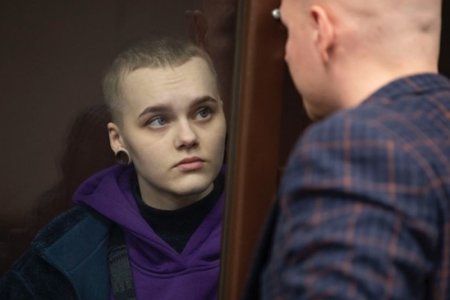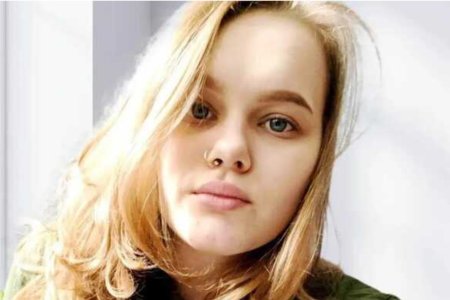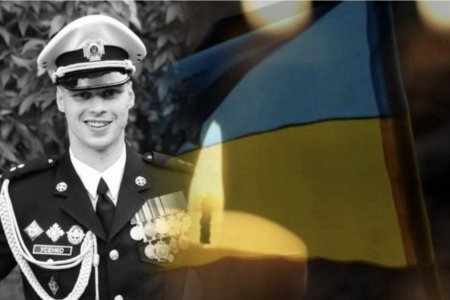
A court in Russia has sentenced Iryna Navalna to eight years’ imprisonment on charges almost certainly based solely on the ‘confession’ she has said was extracted through torture. Iryna’s mother suggested earlier that her daughter, who was just 24 in September 2022, was targeted because of the name she, by chance, shared with Russia’s most famous political prisoner, Alexei Navalny. It is telling that even the Southern District Military Court, which regularly passes huge sentences against Ukrainian political prisoners, dismissed part of the prosecution’s indictment, and passed a sentence that was six years less than that demanded by the prosecutor.
Iryna Navalna had been charged with attempting to commit an act of terrorism (under Articles 205 § 2 and 30 § 3 of Russia’s criminal code) and of illegal possession of an explosive (Article 222 § 3a&b).
The prosecution had claimed that Navalna had ‘entered into a conspiracy’ with Ukraine’s Security Service [SBU] and agreed to carry out a terrorist act. This was, purportedly, in protest at what, in the Russian narrative, is claimed to be “the sovereignty” of the Russian proxy ‘Donetsk people’s republic’ [‘DPR’]. The ‘act of terrorism’ that was claimed to have been planned, but thwarted, was supposed to be against the fake ‘referendum on joining the Russian Federation’ held at gunpoint at the end of September 2022.
A standard element of such indictments is the attempt to minimize any ideological motive by claiming that the person was offered financial reward. Here it was asserted that, as well as 25 thousand UAH from the SBU in August 2022 (to buy the bike allegedly needed to transport the explosive device), Navalna was promised 100 thousand UAH after ‘carrying out the terrorist attack’ and making her way to government-controlled Ukraine.
An accomplice was supposed to have prepared the explosive device and sent it to Mariupol, with Navalna’s role claimed to have been to collect the device, keep it in her apartment and then take it, by bicycle, to a ‘polling station’ at the occupation Prymorsk district administrative body, plant it and, by remote control, detonate it. She was then, supposed to get to government-controlled Ukrainian territory and “receive financial remuneration”.
The prosecution had claimed that Navalna had brought the explosive device to the ‘polling station’ on 27 September 2022 and had gone off to get the remote control in order to detonate it. The device had, allegedly, been discovered, with Navalna soon detained.
Mediazona says that they learned of the 8-year sentence, passed on 7 October 2024, from the 26-year-old Ukrainian’s lawyer Ivan Bondarenko. He explained that the prosecutor had demanded a 14-year sentence, and also a (huge) 400 thousand rouble ‘fine’.
The defence, in turn, had demanded a full acquittal, pointing out that the prosecution ‘witness’ on whose testimony the case had been based had refuted the key claims. He had not, as asserted, seen Navalna and informed the police of a crime, recognizing the young woman who had been detained. Instead, in court, he stated that he had witnessed Navalna being detained. This destroyed the ‘testimony’ of two other supposed witnesses. “Not to mention the fact that it is unclear where she was for a whole month, from when she was detained until criminal charges were laid on 28 October.”
It was Iryna Navalna who first pointed out the discrepancy in time at the first hearing on 23 November 2023. She told the court that she denied the charges and corrected presiding judge Ilya Nikolaevich Bezgub when the latter read out the claim in the file material that she had been detained on 28 October 2022. She had, she said, been in captivity since 27 September 2022. Such lengthy periods, where a person is held incommunicado and without any procedural status, are typically used to extract ‘confessions’ through torture and other forms of duress. Had Russia had any grounds for seizing the young woman at the end of September, they would have brought charges then and, more than likely, trumpeted her ‘arrest’.
It should be said that similar irregularities and worse are a standard feature of Russia’s politically motivated ‘trials’, with the court generally ignoring them and passing the horrific sentences demanded of them.
On this occasion, the court did, at least, reduce the indictment by changing the paragraph of each charge, and thus removing the accusation of attempting the attack as part of a group conspiracy. Nor did the court impose the fine demanded.
Bondarenko called the reduced charges and, therefore, lower sentence “a compliment from the court” which would not have dared acquit Iryna. The defence will be lodging an appeal.
Bondarenko may be correct, however the Southern District Military Court has been churning out politically motivated sentences against Crimean Tatar and other Ukrainian political prisoners since 2014. Thus far, they have not balked at passing manifestly unjust sentences, however clear it was that the charges were fabricated.
As reported, Iryna’s mother, Oleksandra Smoliar suggested that her daughter had been seized because of her name, and recalled the treatment that Iryna had received when she and her mother first left Mariupol, and the fixation with her name in Russian reports.
During the ‘trial’, Iryna herself totally denied the charges and suggested other possible reasons why she had been targeted. Her stepfather was in Ukraine’s Armed Forces, with this the pretext for the Russians to carry out two searches of the family’s home. Her stepfather was among the Ukrainian defenders of the Azovstal Steelworks in Mariupol who were forced to surrender in April – May 2022, and is now also in Russian captivity. Iryna herself was in the process of obtaining work in the police call centre, and suggests that those documents, if found, might also have served as a pretext. There could also be a thoroughly banal reason, namely that she had often ridden past and caught the Russians’ attention.
All of this was clearly stated in court, together with harrowing details of the beatings, electric shocks and other torture to which she was subjected.
The point, it should be stressed, was not merely in Navalna’s denial and account of torture, but in the evident flaws in the prosecution’s story. During the same hearing, the prosecutor tried to establish Navalna’s negative attitude to what he termed the ‘special military operation’ (Russia’s euphemism for its full-scale invasion of Ukraine) as though this was ‘evidence’. He then attempted to suggest that some of her tattoos were ‘incriminating’, while positively trying to stop her from showing the said tattoos. Most importantly, he insisted on reading out the ‘testimony’ provided earlier, which Iryna had clearly stated had been extracted through torture. Nor was this merely a matter of whether or not one believes the defendant, since there was no other good reason for holding Iryna incommunicado and without charges for a full month, with this in violation even of Russian legislation.
A lighter than demanded ‘sentence’ does not excuse the Russian judges from complicity in this travesty. Quite the contrary, since removal of the ‘conspiracy’ charge effectively confirms everything that Iryna Navalna stated about how, and when, her supposed ‘confession’ was obtained.



